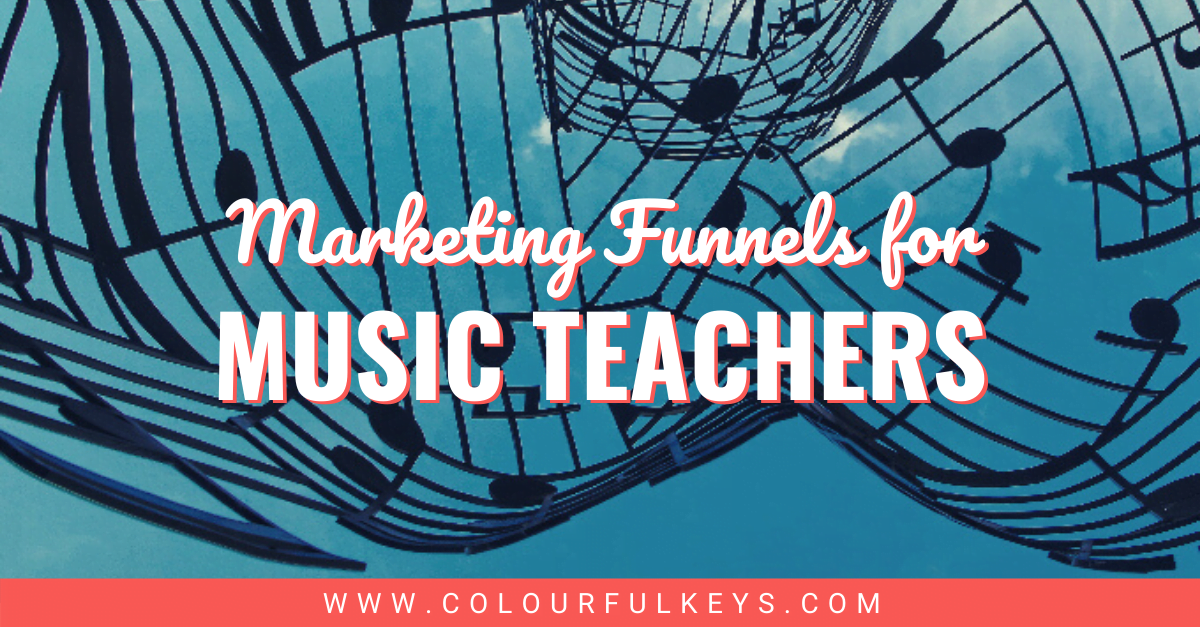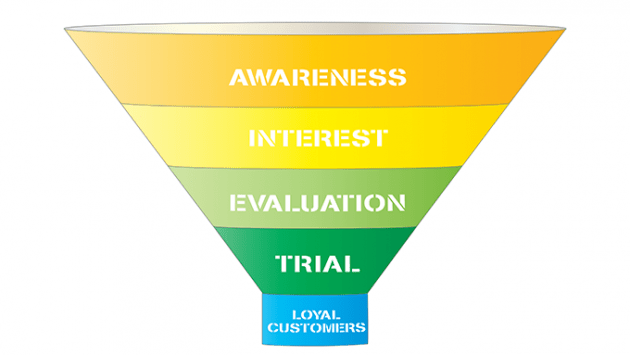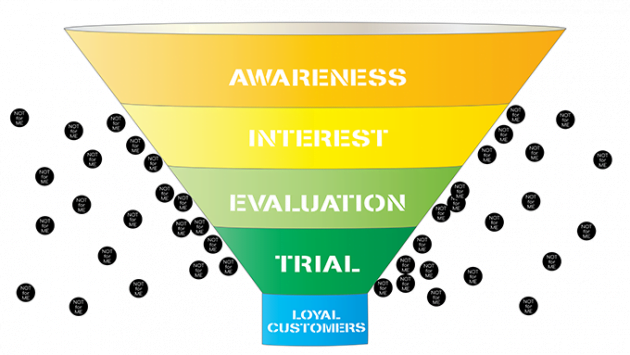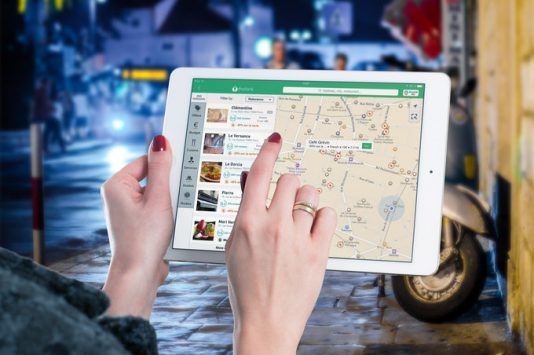Tell me if this sounds familiar: You’re getting lots of hits on your studio website, and even plenty of phone calls asking about openings…but it seems like so many of these leads fall apart without becoming students.
By this point, you might be asking yourself, “What am I doing wrong? Why aren’t all of these people signing up for lessons?”

I’m going to let you in on a little secret: You don’t want every potential student to enroll in lessons.
The number of students who sign up with your studio should be far less than the number of people who show an interest.
That sounds crazy, right?
Once you understand the music teacher marketing funnel, it makes perfect sense.
What is a Marketing Funnel?
Marketing funnels are a way of visualising the journey of a potential customer for a business, from first knowing about the service or product all the way through to actually signing up or purchasing.

The reason that the funnel gets smaller as we work our way down is that some of the people who first become aware of the business are not a good fit. Those people decide that it’s not for them, and so, they move on.

This is useful because it helps us understand two things:
- What the stages are in the average potential customer’s journey
- That we don’t have to be right for everyone, just right for the right people
An Example of a Marketing Funnel
Let’s take an example of a hairdresser to see this in action.
Awareness
Jane walks by the hairdresser on High Street and notices the quirky name: ‘Cutting it Fine’.
Interest
This hairdresser is on Jane’s route to work, so she walks past every day and the different styles and testimonials displayed in the window catch her eye. It looks like this hairdresser really goes the extra mile to please its customers.
Evaluation
Jane has been looking for a new hairdresser since her favourite stylist moved away so she looks up some reviews online to see if it’s really legit and asks some friends if they’ve ever been.
Trial
All the reviews (both online and in real life) seem pretty good so she decides to give it a go. She’s nervous (and understandably protective of her hair!) so she decides to just go in for a small trim and blow-dry.

Loyal Customer
The experience is wonderful and the stylist really takes the time to give Jane some advice and tips for managing her particular hair. Jane books in a regular appointment on the way out.
Great result, right? But the important part to understand is that at any one of those stages, Jane could have decided it wasn’t for her.
And that’s good. The hairdresser should only want the clients that are a perfect fit for them and will rave about the service to all their friends.
The Music Teacher Marketing Funnel
The whole idea of a marketing funnel, with these same 5 stages, can be a useful tool for understanding music studios too.
What does your funnel look like? How do people find you and figure out if you’re right for them and their child?
Awareness of your music studio
Parents normally hear about a particular music teacher or music school through:
- Word of mouth from another parent
- Search engine results
- Flyers on school or community bulletin boards
- Parenting websites
What works in terms of getting your studio in front of parents will vary from city to city and town to town. You can find lots more ideas for building awareness in this article.

It’s good to understand how you can best reach parents in your community, but most teachers stop here – and there’s so much more to the story!
For even more info related to marketing your studio, check out the Marketing section of my Studio Business page.
Interest in your music studio
Let’s say the potential parent has seen your website/flyer/ad…what catches their eye? What makes them stop and think about it for an extra few seconds?
It’s that extra little attention grabber that makes all the difference in this stage of the funnel. You need to make them think more than “music studio” when they see your business. You need an identity.
It doesn’t particularly matter what that identity is, as long as it’s something some cohort of your community will want. You could be the studio that plays games, the studio with collaboration or the studio that achieves outstanding exam results.
What you can’t be is the studio that teaches music. That doesn’t take parents from aware to interested.
Evaluation of your music studio
This is where the testimonials and further information on your website come in.
To get your potential parents through this stage of the funnel, you need to make sure that all the information about and representation of your studio reflects the aspect of your studio that made them interested.
In other words, if they see a flyer that talks about fun and games but then they look you up and your online presence is super stuffy, they’re not going to move further down the funnel. At the very best they’ll be confused and give up, and at worst they’ll think your business is a bit two-faced.
Trial lessons or meetings
I’m not saying you have to offer free trial lessons. The trial stage doesn’t have to include an actual trial. This could be the phone call you have with them or the first meeting or tour of your studio.

This stage is all about continuing to reinforce that wow factor which made them interested and backing it up with all the details that make your studio great.
Loyal piano families
Woohoo! This is where our fun really begins. We have a new student and we get to guide their musical journey.
Once you’ve got them through all of that, make sure they stick around. Put an onboarding system in place so that your marketing funnel ends in a bucket, not a drainpipe.
What Your Studio Isn’t…
Understanding why parents exit your funnel is just as important as understanding what leads a parent to work down your marketing funnel. In an ideal world, plenty of people are leaving because they’re deciding it’s “not for them”.
That’s how it should be. You don’t want the bargain hunters who are going to quibble over your pricing. If you focus on games and improvisation, you don’t want the parents who think that music lessons should be sombre and serious.
As long as you’re clearly communicating who your studio is perfect for, then you can take comfort in the shape of the marketing funnel. You’re not losing those people – it just wasn’t for them and that’s OK.
Do you understand your music studio’s marketing funnel?
Does the idea of the music teacher marketing funnel help you think differently about how your studio acquires students? Let me know in the comments below.
Note: The phrase “not for me” in this context comes from the wonderful Seth Godin. I highly recommend his book This is Marketing if you want to dive further into learning about this stuff in a non-gross or smarmy way.